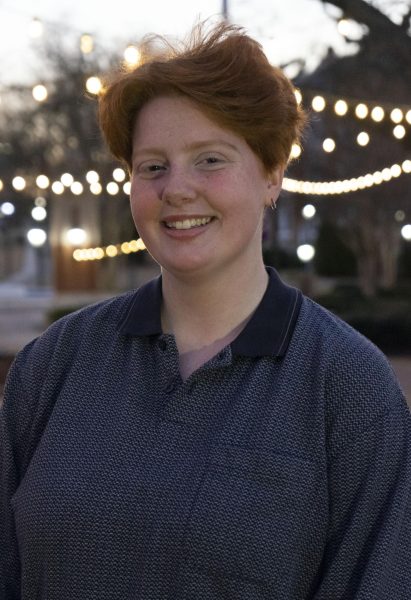Scholar Day: a spotlight for student research
April 15, 2022
On the eighth of April, the first floor of Collier Library was anything but quiet. In fact, the building was bustling with activity. Students at the University of North Alabama created a path of poster boards throughout the room, each displaying thoughtfully executed research projects. In front of each poster, a student stood, encouraging spectators to take a look at their poster and ask questions about the study they had conducted. Fellow students, parents and faculty walked around with wide smiles, eager to see what these bright minds had spent the past months or years formulating. This exhibition of creativity is called Scholar Day.
Dr. Matthew Price, the Director of the Center for Premier Awards and Scholarly Engagement, oversaw the event. In his position, he helps students apply for national and international awards; he also provides funding and support for students to pursue research, talking to students along the way about the different ways they can get involved. Scholar Day exists to showcase the students who work with professors to conduct this research.
“Originally, [Scholar Day] was a part of the quality-enhancement plan for the university,” Price said. “It was a research literacy plan, which was to bring about more research practices into course work. Out of that initiative, Scholar Day was born, and we’ve carried it over since that time.”
This year, Scholar Day was broken into sections based on what types of presentations were taking place. Students displayed their work using poster boards, speeches and multimedia presentations. No matter which type students picked, those involved were able to gain experience speaking in front of crowds of onlookers, which many will benefit from when presenting future research or interviewing for internships or jobs.
“It is really amazing to see their level of confidence so early in their academic careers,” Price said. “We have students who are working on really amazing work who are juniors, and when I think back to when I was a junior, waking up on time was a chore! These people are looking at chromosomes and genetics, and they’re thinking about how to make the world a better place. Seeing all this, I can’t believe that they get to be around all of these things and see these students doing all of this work. A lot of it is really consequential work! They’re so confident, and when you talk to them about their presentation, you can see the passion that they have for it and the interest that it unlocked in them by doing the work. It is so cool to watch.”
Students’ passions cover a wide variety of topics, and their presentations proved just that. One student researched the level of stress hormones present in firefighters, both during training and real emergencies. A nursing student interviewed peers to find out if nursing curriculum changes students’ views on geriatric care. Other studies included the effects of social media on self-image, the impact of excessive light at night on animal species and discussions between tenth graders on the morality of colonists’ actions during the Revolutionary War. No matter the topic, each student clearly showed a passion for their project and the conclusions that they drew from their research.
An example of a passionate researcher is Emily Ingle, a freshman pre-professional biology major with minors in chemistry and psychology. Her interest in genetics prompted her to partner with Dr. Cynthia Stenger in a research project.
“I’m presenting on a mutation of the gene CDKL5 and its mutation E181K, where amino acid is swapped for lysine,” Ingle said. “I’m trying to analyze the effect of that swap. I came to the conclusion that evidence supports a pathogenic categorization for the variant. It’s likely pathogenic, but I can’t make that call. I can just support it.”
Ingle is hopeful that this research will lead to an internship at the HudsonAlpha Institute for Biotechnology, a company that works to innovate in the field of genetic technology. Through doing this project, Ingle has learned that there is much more to the study of genetics and disease-causing mutations than meets the eye. Because of this, she hopes that her research and the research of other UNA students will serve as inspiration for those who attended the event.
“I hope I can teach that a freshman student can do significant research that can actually go toward something more than just their own research experience,” Ingle said.
Price shares a similar sentiment, wishing that those in attendance, especially those at the beginning of their academic career, will see the strides being made by their cohorts and will become energized to begin research of their own. He maintains that students in any area of study with any background can conduct meaningful research, and this research should be acknowledged by the university.
“I think it’s important that we recognize the amazing things that students do,” Price said. “Speaking as a kid from a rural background who went to a rural school, there’s sometimes this presumption that only great things happen at Harvard and Yale, but that’s just not true! Inspiration and creativity happen anywhere. Our students do it, and they do it at the same level as anybody else. For me, what I see at Scholar Day is the recognition of how amazing our students are and how full of promise their careers can be, wherever they end up taking them. My job is to provide avenues and support so students feel comfortable putting themselves out there and learning to do it so they can show the world how special they are. I have the best job in the world, hands down.”
Price encourages all students who may be interested in doing research to reach out to him to start the conversation and get assistance with beginning the process.











